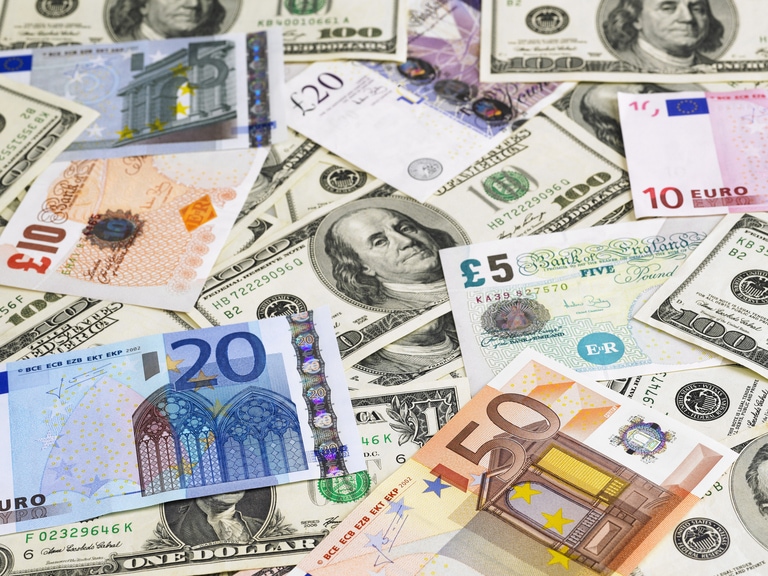European markets have slipped back today with the FTSE 100 slipping below the 8,000 level despite some broadly better than expected flash PMI numbers, which showed that economic activity broadly improved in February. While a positive development, this has served to help push yields higher in anticipation that central banks might have to be slightly more hawkish when it comes to raising rates in the coming weeks.
The HSBC share price has risen to its highest levels since September 2019 after a solid set of full year numbers, although the initial reaction initially saw the share price slide back. The consideration of an incremental special dividend on the back of the proceeds of the $10bn Canadian bank sale appears to have swayed sentiment as the day has progressed.
Today’s Q4 and full year results initially prompted some share price weakness despite Q4 adjusted pre-tax profits coming in ahead of forecasts at $6.83bn, a rise of 92% year on year. This weakness didn’t last long with full year adjusted pre-tax profits increasing to $24.01bn, a rise of $3.4bn. Full year revenues were also higher, coming in at $51.7bn while net interest margin for the year rose to 1.48% from 1.2% a year ago. Total provisions for non-performing loans came in at $3.95bn, with an extra $1.4bn being set aside in Q4.
Intercontinental Hotels shares are also on the back foot slipping to one-month lows, after reporting full year results which were a little disappointing, although today’s declines do need to be set in the context of a strong start to the year for the share price. Full year revenues rose by 34% to $3.89bn, while operating profits increased 27% to $628m.
The weakest area was the Greater China region, not altogether surprising given the Covid restrictions in place for most of last year, and which should show a significant improvement over the next 12 months. This region saw RevPAR fall by 38% year on year, and 42% in Q4. The Americas saw the best performance which saw RevPAR of 3% compared to 2019 levels.
The second half of the year saw RevPAR running ahead of 2019 levels in both EMEAA and the Americas as demand rebounded strongly, with only China acting as a drag. With the Chinese economy continuing to reopen this region can only improve, which ought to be positive for the upcoming financial year.
Vodafone today said it was selling its Ghana operations to Telecell Group, although there were no details on the financial intricacies of the deal. Antofagasta reported full-year revenues of $5.86bn, a 22% decline due to lower copper prices, while profits before tax falling 26% to £$2.56bn.
Medical devices business Smith & Nephewshares have edged higher despite full year results coming up slightly short of expectations. Full year profits fell to $901m on slightly lower margins of 17.3%, which have been hit by higher costs. The full year dividend was kept unchanged, at 37.5c a share, however the company was more upbeat about the outlook, revising its midterm targets to +5% revenue growth and an improvement in trading profit margin to 20% by 2025.
US
US markets have returned from their long weekend opening lower amid caution and rising yields ahead of the release of tomorrow’s Fed minutes, after last week’s hawkish comments from non-voting members Bullard and Mester last week.
With US retail sales seeing a slowdown at the end of last year it would be perfectly reasonable to think that this morning’s Q4 numbers from Walmart and Home Depot might be disappointing.
Today’s numbers from Home Depot appear to reinforce the weak narrative with comparable store sales falling 0.3% in Q4, against an expectation of a 0.3% gain. Other that the numbers weren’t that bad, with net sales coming in at $35.83bn, while profits beat expectations, coming in at $3.30 a share. The outlook, however, was disappointing with Home Depot forecasting flat sales growth for 2023, while operating margins are set to come in below 14.5% due to higher wage costs.
Walmart’s Q4 numbers were much better, the shares initially slipping back, with revenues rising to $164.05bn, which was a record quarter, and US comparable sales rising by over 8%, while profits came in at $1.71c a share, building on the solid numbers seen in Q3. On the outlook, Walmart expects to see Q1 sales growth of 5% and profits of between $1.25 to $1.30 a share, with the full year picture appearing to be more challenging. Annual EPS profits are expected to be lower than this years $6.29 a share, at between $5.90 to $6.05 a share.
FX
The pound is the best performer today, although there was little initial reaction from the pound even as UK public finances unexpectedly posted a surplus in January of £5.4bn. This was helped by higher-than-expected inflows from self-assessment of £21.9bn, as well as strong inflows from capital gains tax, which contributed £13.2bn.
This is good news for the chancellor of the exchequer as it means that the UK government has borrowed £30.6bn less than OBR forecasts. It also potentially gives him more wriggle room in next month’s Budget to rethink some of the recent tax hikes, specifically the increase in corporation tax, which has been widely criticised. The catalyst for the move higher was a much-improved PMI report which showed that services activity rebounded strongly in February to 53.3 from 48.7 in January, rising to its highest level since June last year.
The US dollar has also outperformed along with rising yields, helping to drive the greenback to two-month highs against the Japanese yen.
It’s been a mixed bag for crude oil prices today with Brent crude underperforming its WTI counterpart, despite better-than-expected economic data from Europe as well as the US. While manufacturing has underperformed, we’ve seen a strong performance from services, probably due to the milder winter weather.
Despite the sharp rise we’re seeing in yields, and the strength of the US dollar, gold prices are only slightly weaker, perhaps reinforcing the idea that these US dollar moves have more to do with position adjustments ahead of tomorrow’s Fed minutes which could come out as unexpectedly hawkish.
Volatility
With US markets closed yesterday for a public holiday, price action was broadly suppressed as the new trading week got underway. Some pockets of volatility were however once again in evidence, with NatWest Group a standout here as the lender continued to try and find a footing after last week’s sell-off. One day vol sat at 42.63% against 30.33% on the month.
Keeping with banks and Italy’s UniCredit saw elevated levels of movement on Monday as the stock pulled back from recent highs. US regulators are taking a close look at other European banks who still have interests in Russia and although UniCredit hasn’t been dragged into this there’s a degree of read-across being seen. One day vol sat at 61.98% against 45.95% on the month.
A break-out for solana left the token to test fresh four-month highs during Monday’s trade. There was little in the way of common direction for crypto markets, but one day volatility here printed 105.68% against 82.91% for the month. Solid gains for bitcoin cash also drove the asset to six-month highs, lifting daily volatility to 86.71% against 58.25% for the month in the process.






